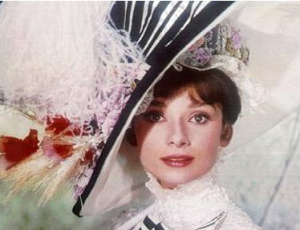When I was still a kid, My Fair Lady won eight Oscars (only seven films have won more), so as far as my generation was concerned, Audrey Hepburn was Eliza Doolittle and Rex Harrison was Henry Higgins. But 25 years earlier, George Bernard Shaw had won an Oscar for the 1938 film version of his stage play, Pygmalion: A Romance in Five Acts. It was up to me to catch up with the real thing, and I finally have.
Now that I have seen Pygmalion, My Fair Lady feels like burlesque– a marvelous, vigorous burlesque, but a thin reduction of the original literary work. Pygmalion is more substantial in every way: the cruel class prejudices are more heartfelt and searing, not only because the script is superior, but because the dialogue is not sentimentalized into song. Consider the song Without You, taken from a line in Shaw’s script where Liza says to Higgins, “You are a motor bus: all bounce and go, and no consideration for anyone. But I can do without you: don’t think I can’t.” Replacing resoluteness with rhyme and– don’t get me wrong–brilliant inventiveness, Alan Jay Lerner has Liza sing, “There’ll be spring every year without you. England still will be here without you. There’ll be fruit on the tree. And a shore by the sea. There’ll be crumpets and tea without you.” And I contend that it’s a steep drop from the pith of “Don’t think I can’t” to the pathos of “There’ll be crumpets and tea without you.”
There’s little sentimentality of any sort, in fact. One particularly tough-minded incident occurred when Alfred Doolittle (Wilfred Lawson) arrives to shake down Henry Higgins (Leslie Howard) for some cash. In the middle of a lively disagreement, Doolittle flips the British bird (the V-sign), thrusting his grimy fingers into the air at the fussy professor. It knocked me for such a happy loop I had to rewind to be sure I’d seen right.
The script belongs to Shaw, but the movie belongs to Leslie Howard, who co-directed it with Anthony Asquith (David Lean was the editor). Howard displays all his genius here. I’ve been a fan since I saw The Petrified Forest and Gone with the Wind when I was in high school, but he still surprised me in this role. He charms the audience in spite of his essentially loathsome character (the charm is provided by Shaw’s writing; Rex Harrison benefitted, too). Higgins ruthlessly hurls insults at Eliza– “I shall make a duchess of this draggletailed guttersnipe“– and some insults aren’t even at her, they’re toward or about her: “Pickering: shall we ask this baggage to sit down or shall we throw her out of the window?” The script is a compendium of vilification, but so laced with Shavian wit that we can’t help but be entranced and amused, especially with Howard’s enthusiastic, light-as-a-feather delivery.
Wendy Hiller creates an intelligent, strong-willed, sympathetic Eliza, but– and I regret admitting this– I could not for the life of me erase Audrey Hepburn’s later Eliza. I don’t even consider Hepburn a formidable actress, but she is so winning in the role of Eliza Doolittle, so dazzlingly beautiful (and costumed), and so sturdily supported by Harrison, Wilfred Hyde-White, and Gladys Cooper, that other Elizas can’t help but pale in comparison. I rush to acknowledge that Hiller is the superior actress– more accomplished, more subtle, more down-to-earth– but Hepburn flat-out owns this role. It makes one wonder what would have happened if a less glamorous actress (read: Julie Andrews) had been cast in the film. Perhaps Lizas past and future wouldn’t suffer the sad fate of inevitably being compared to, and receding before, the pure pulchritude of Audrey Hepburn.



